Donald Trump ally Roger Stone sentenced to over 3 years in prison

Donald Trump publicly decried Stone’s conviction as unfair soon after the sentence was pronounced.
US submits extradition request for WikiLeaks founder Julian Assange
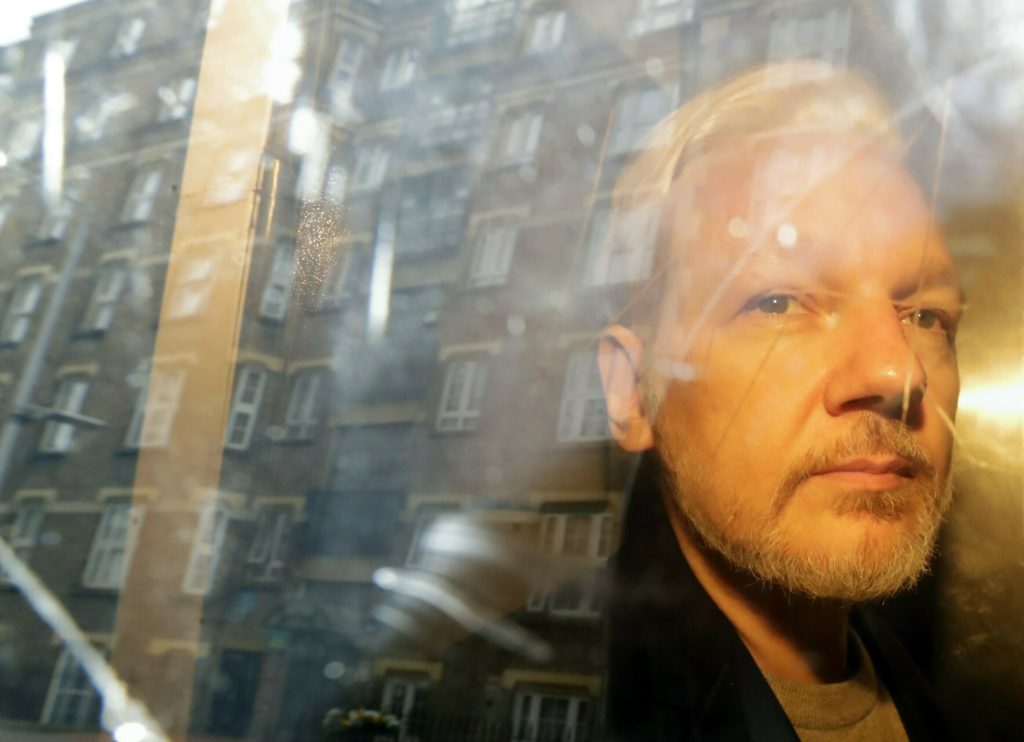
The United States government has formally submitted an extradition request to the United Kingdom for WikiLeaks founder Julian Assange, a Justice Department official said Tuesday. Assange faces an 18-count indictment that accuses him of soliciting and publishing classified information and of conspiring with former Army private Chelsea Manning to crack a Defense Department computer password. That indictment, which includes Espionage Act charges, was issued by the Justice Department last month and is pending in federal court in Alexandria, Virginia. The extradition request had been expected ever since U.S. authorities first announced a criminal case against Assange. Justice Department spokesman Marc Raimondi said it was submitted to the United Kingdom. The 47-year-old Assange was evicted on April 11 from the Ecuadorian Embassy in London, where he had been holed up since 2012 after Ecuador granted him political asylum. He was arrested by British police and is currently serving a 50-week sentence for jumping bail. Sweden also seeks him for questioning about an alleged rape, which Assange has denied. Assange was initially charged with a single computer crime violation on allegations that he worked with Manning to crack a government password. Some legal experts have said the additional Espionage Act charges might slow or complicate the extradition process to the extent the United Kingdom views them as political offenses and therefore exempt from extradition. Manning, who spent seven years in a military prison for delivering a trove of classified information to Assange before having her sentence commuted by then-President Barack Obama, has been jailed for civil contempt in Virginia after refusing to testify before a grand jury investigating WikiLeaks. By Eric Tucker Associated Press. Follow Eric Tucker on Twitter at http://www.twitter.com/etuckerAP Republished with the permission of the Associated Press.
With clemency for Chelsea Manning, attention turns to WikiLeaks head
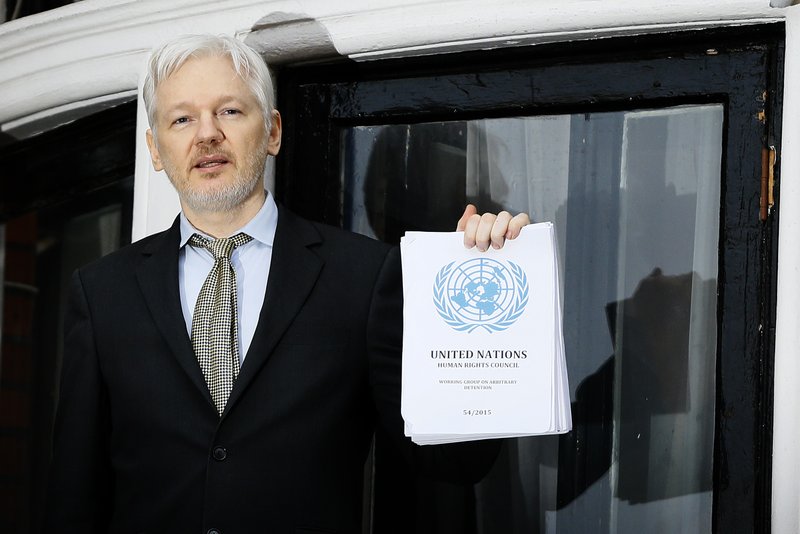
President Barack Obama‘s decision Tuesday to commute Chelsea Manning‘s sentence brought fresh attention to another figure involved in the Army leaker’s case: Julian Assange. On Twitter last week, Assange’s anti-secrecy site WikiLeaks posted, “If Obama grants Manning clemency Assange will agree to US extradition despite clear unconstitutionality of DoJ case.” Obama’s move will test the promise. The president commuted Manning’s 35-year sentence, freeing her in May, nearly three decades early. Manning has acknowledged leaking a trove of diplomatic cables and national security documents to WikiLeaks in 2010. In a statement, Assange called Manning “a hero, whose bravery should be applauded.” Assange went on to demand that the U.S. government “should immediately end its war on whistleblowers and publishers, such as WikiLeaks and myself,” but he made no mention of the Twitter pledge. His lawyer said he has been pressing the Justice Department for updates on an investigation concerning WikiLeaks. Assange has been holed up for more than four years at the Ecuadorian Embassy in London. He has refused to meet prosecutors in Sweden, where he remains wanted on an allegation of rape, fearing he would be extradited to the U.S. to face espionage charges if he leaves the embassy. The Justice Department has never announced any indictment of Assange, and it’s not clear that any charges have been brought under seal. The department, in refusing to turn over investigative documents sought by Manning under the Freedom of Information Act, has acknowledged that the FBI is continuing to investigate the publication of national security information on WikiLeaks arising from Manning’s disclosures. “That investigation concerns potential violations of federal criminal laws, in the form of serious threats to the national security, and the investigation continues today,” Justice Department lawyers wrote in a court filing last year. “From the terms of her request, it is clear that Manning seeks to obtain documents concerning that investigation. Separately, the FBI is also investigating Russian meddling through hacking in the U.S. presidential election. Hacked emails from top Democratic officials and Hillary Clinton campaign officials were posted on WikiLeaks in the final weeks of the presidential race. With the commutation coming just days before Obama leaves office, any decision on whether to charge or seek to extradite Assange will now fall to the Trump administration. In a statement Tuesday, a lawyer for Assange did not address whether Assange intended to come to the U.S. “For many months, I have asked the DOJ to clarify Mr. Assange’s status. I hope it will soon,” Assange’s lawyer, Barry Pollack, said in the statement. “The Department of Justice should not pursue any charges against Mr. Assange based on his publication of truthful information and should close its criminal investigation of him immediately.” Another Assange lawyer, Melinda Taylor, suggested he wouldn’t go back on his word. “Everything that he has said he’s standing by,” she said in a brief telephone conversation with The Associated Press. Republished with permission of The Associated Press.
WikiLeaks is testing the power of full ‘transparency’
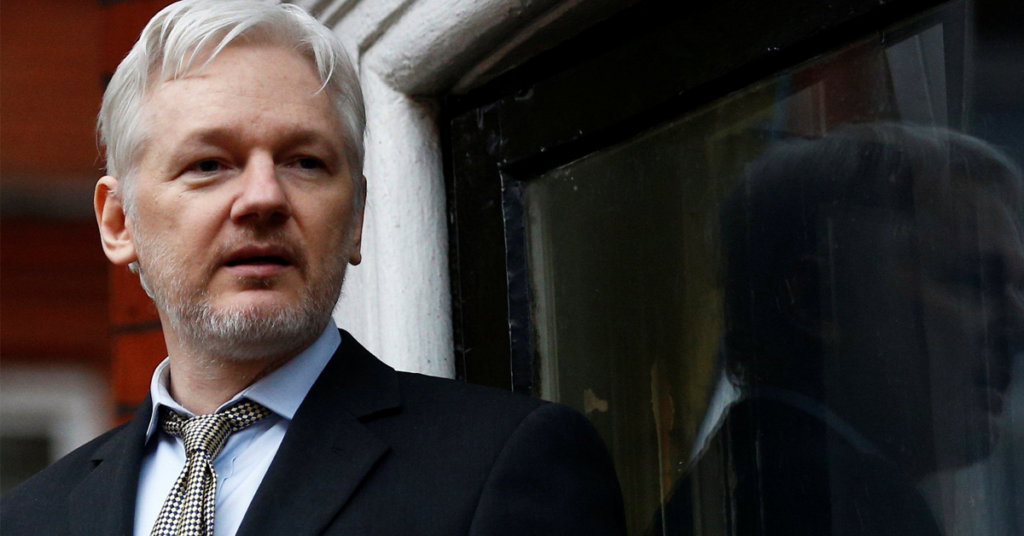
WikiLeaks founder Julian Assange first outlined the hypothesis nearly a decade ago: Can total transparency defeat an entrenched group of insiders? “Consider what would happen,” Assange wrote in 2006, if one of America’s two major parties had their emails, faxes, campaign briefings, internal polls and donor data all exposed to public scrutiny. “They would immediately fall into an organizational stupor,” he predicted, “and lose to the other.” A decade later, various organs of the Democratic Party have been hacked; several staffers have resigned and Democratic presidential candidate Hillary Clinton has seen the inner workings of her campaign exposed to the public, including disclosures calling into question her positions on trade and Wall Street and her relationship with the party’s left. Many of these emails have been released into the public domain by WikiLeaks. Some see the leaks as a sign that Assange has thrown his lot in with Republican rival Donald Trump or even with Russia. But others who’ve followed Assange over the years say he’s less interested in who wins high office than in exposing – and wearing down – the gears of political power that grind away behind the scenes. “He tends not to think about people, he thinks about systems,” said Finn Brunton, an assistant professor at New York University who has tracked WikiLeaks for years. “What he wants to do is interfere with the machinery of government regardless of who is in charge.” WikiLeaks’ mission was foreshadowed 10 years ago in “Conspiracy as Governance,” a six-page essay Assange posted to his now-defunct blog. In the essay, Assange described authoritarian governments, corporations, terrorist organizations and political parties as “conspiracies” – groups that hoard secret information to win a competitive advantage over the general public. Leaks cut these groups open like a double-edged knife, empowering the public with privileged information while spreading confusion among the conspirators themselves, he said. If leaking were made easy, Assange argued, conspiratorial organizations would be gripped by paranoia, leaving transparent groups to flourish. When the group published 250,000 U.S. State Department cables in 2010, it helped launch a multimillion dollar quest to unmask insider threats at home while causing problems for U.S. diplomats overseas. The recent leaks have affected the Democratic National Committee in much the same way, with staffers advised to use caution when communicating about sensitive topics. Clinton supporters say Assange is targeting her out of partisan bias. U.S. intelligence officials believe Russia is behind the hacks to interfere in the U.S. election. “Wouldn’t it be good reading to see internal discussions (about) Trump’s taxes?” Clinton Press Secretary Brian Fallon tweeted recently. “Wikileaks isn’t targeting Trump. That tells you something.” It’s possible that malicious sources are using WikiLeaks for their own ends, said Lisa Lynch, an associate professor at Drew University who has also followed Assange’s career. But she noted that a lifetime far from public service and an aversion to email make Trump a more difficult target. “If Trump had a political career, he’d be more available for Wikileaking,” she said. Assange did not return messages seeking comment, but he has described allegations that he’s in the service of the Kremlin as a conspiracy theory and has denied picking sides in the U.S. electoral contest. “Mr. Assange has not endorsed any candidate,” the group said in a statement Monday. He has targeted Republican politicians in the past; in the run-up to the 2008 election his group published the contents of vice presidential candidate Sarah Palin’s inbox. Her reaction at the time anticipated the Democrats’ outrage today. “What kind of a creep would break into a person’s files, steal them, read them, then give them to the press to broadcast all over the world to influence a presidential campaign?” Palin wrote in her autobiography, “Going Rogue.” In fact, Assange has long tried to influence presidential campaigns. In 2007, WikiLeaks published a long-suppressed corruption report ahead of Kenya’s national elections. It unleashed a wave of anger and, Assange often boasts, swung the vote. In reality, the publication barely played a role in Kenya, according to Nic Cheeseman, an associate professor of African politics at the University of Oxford. And it’s not clear whether the recent WikiLeaks revelations will fare differently. Clinton has a commanding lead in the polls despite the leaks. Still, Assange appears game to try. Between the DNC emails and the inbox of Clinton campaign chairman John Podesta‘s messages, his organization has published 46,000 messages from some of the most powerful people in Democratic politics. More is coming. When one Twitter user noted that WikiLeaks had not published any of Podesta’s emails dating past March 21, WikiLeaks responded . “Well spotted,” it said. “Something to look forward to.” Republished with permission of the Associated Press.
Top Hillary Clinton aide links Roger Stone to Russian email hacking
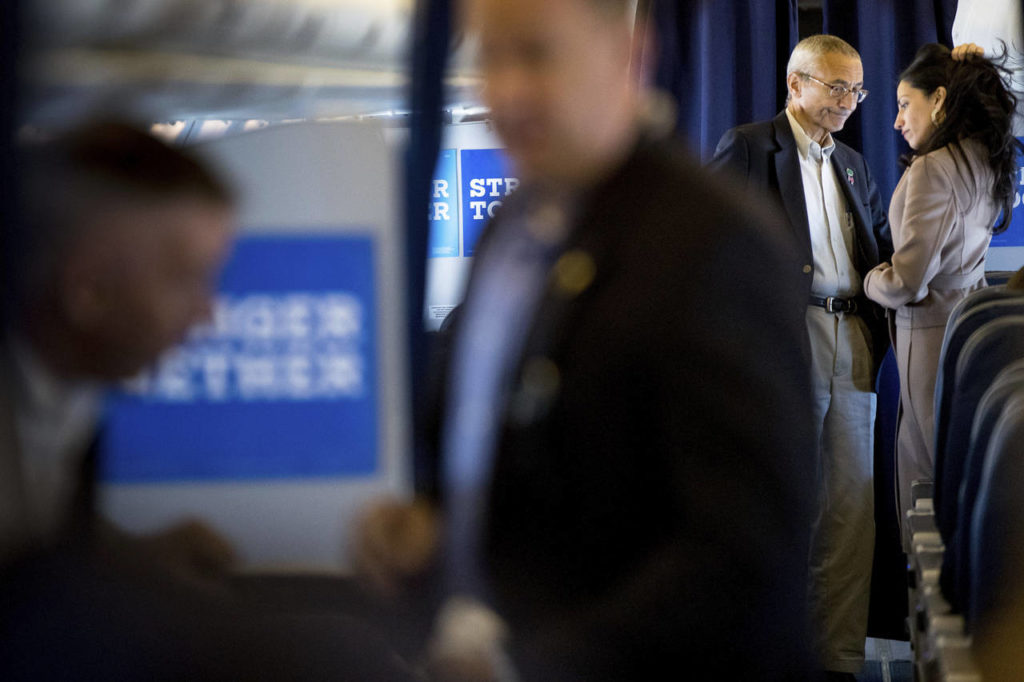
Hillary Clinton‘s top adviser said the FBI is investigating Russia’s possible role in hacking thousands of his personal emails, an intrusion he said Donald Trump’s campaign may have been aware of in advance. If true, the assertion from Clinton campaign chairman John Podesta would amount to an extraordinary link between Russia and an American presidential campaign. Podesta said the alleged ties could be driven either by Trump’s policy positions, which at times echo the Kremlin, or the Republican’s “deep engagement and ties with Russian interests in his business affairs.” To Podesta, the central figure in the swirling controversy is longtime Trump adviser Roger Stone, who has said he has been in touch with WikiLeaks founder Julian Assange. Podesta also raised as evidence an August tweet in which Stone said Podesta’s “time in the barrel” was coming. The tweet was sent shortly after WikiLeaks published scores of hacked emails from other Democratic officials. “I think it’s a reasonable assumption, or at least a reasonable conclusion, that Mr. Stone and the Trump campaign had advance warning about what Assange was going to do,” Podesta told reporters aboard the Clinton campaign plane. Podesta acknowledged the evidence was “circumstantial.” Stone, in an email to The Associated Press late Tuesday, said Podesta’s accusations were “categorically false” and “without foundation.” WikiLeaks tweeted Wednesday that it “has had no contact with Roger Stone.” Podesta said the FBI contacted him over the weekend and confirmed it was investigating the hacking of his account as part of the ongoing probe in other Democratic Party hackings by groups with Russian ties. Last week, intelligence officials said they believed the individuals responsible are working for Russian intelligence and coordinating with Assange on the political hacking. Russian Ambassador to the U.S. Sergey Kislyak dismissed the accusations as untrue. “We are watching very carefully the election campaign in this country,” Kislyak said Tuesday at a discussion of bilateral affairs at Johns Hopkins University’s campus in Washington. “We don’t interfere (in) the internal affairs of the United States, neither by my statements nor by electronic or other means.” Clinton has repeatedly accused her opponent of being soft on Russia, pointing to his praise of Russian President Vladimir Putin as a strong leader, his suggestion that he would rethink sanctions against Russian officials, his sharp criticism of NATO and other policy positions. While Podesta didn’t directly accuse Trump of assisting in any Russian meddling with American campaigns, he suggested Trump was either “willfully ignoring” intelligence officials’ warnings about Russian government involvement or “an unwitting agent of the Russian Federation.” The Clinton campaign would not confirm the authenticity of Podesta’s leaked emails, noting that Russian hackers often fabricate documents. “The pattern is they hack, they leak truthful things, and then they build up to leaking documents that are either doctored or wholly fabricated,” said Jennifer Palmieri, Clinton’s communications director. Trump seized on the hacked emails at a rally Tuesday night in Florida, alleging the documents show that “Clinton is the vessel (of) a corrupt global establishment that’s raiding our country and surrounding the sovereignty of our nation.” Also citing WikiLeaks, Trump said: “The Department of Justice fed information to the Clinton campaign about the email investigation so that the campaign could be prepared to cover up for her crimes. What is going on?” In May 2015, Clinton spokesman Brian Fallon alerted staffers that the Justice Department was proposing to publish Clinton’s work-related emails by January in response to requests by news organizations. Fallon, a former Justice Department spokesman, wrote that unspecified “DOJ folks” told him there was a court hearing planned soon in the case. The dates of court hearings would have been publicly posted in advance on the court’s docket. Fallon did not respond to a request for comment from AP. The Justice Department declined to discuss Fallon’s email. Still, Trump said, “This is collusion and corruption of the highest order and is one more reason why l will ask my attorney general to appoint a special prosecutor,” following up on his debate threat to put Clinton in jail. WikiLeaks dropped the first batch of Podesta’s emails shortly after news organizations released a video in which Trump is heard making sexually predatory comments about women. That video has deeply damaged Trump’s campaign, leading several Republicans to revoke their support for the businessman. Podesta said Tuesday the timing of his emails’ release was an “awfully curious coincidence.” “Mr. Assange wanted to change the subject,” Podesta said. “He didn’t succeed in doing that.” Republished with permission of the Associated Press.
Democratic donors, allies offer reward for Donald Trump tax returns
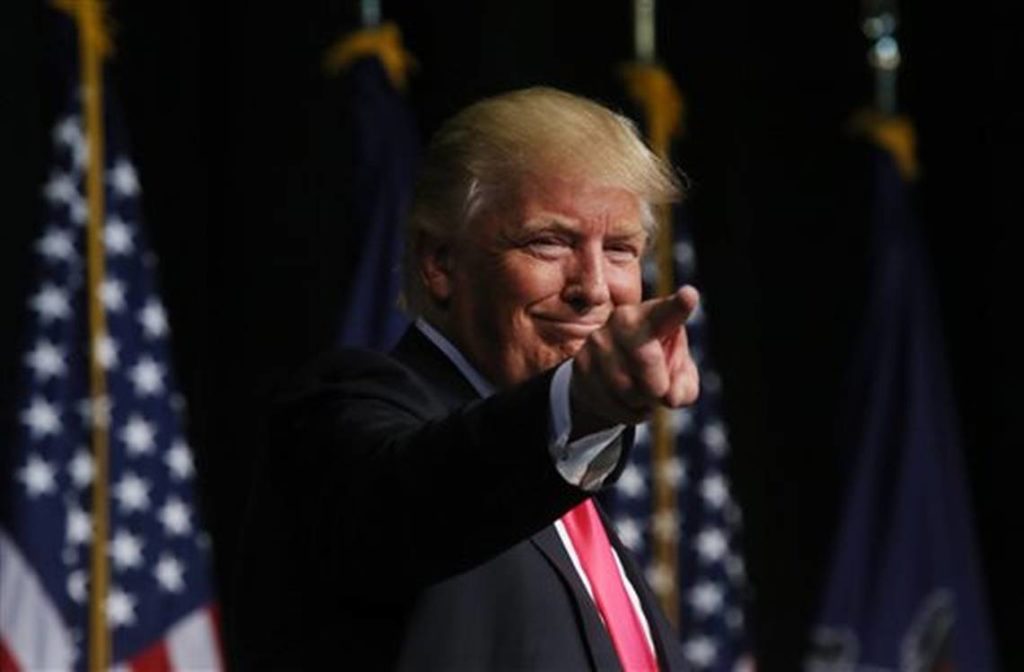
The wealthy Democratic donors, many of them executives who run complex businesses, know firsthand how revealing tax returns can be. Perhaps that’s why they can’t stop talking about Republican nominee Donald Trump‘s refusal to release his. In their suites at the Ritz Carlton hotel, where many are staying during this week’s Democratic convention, and at its auxiliary swanky parties, the supporters of Hillary Clinton are sounding the alarm about Trump’s break with decades of presidential campaign tradition. Clinton put out eight years of recent tax filings last summer, and they lament that voters don’t seem to understand why Trump’s refusal to do the same matters. Democratic talk of the taxes spilled onto the convention stage Wednesday night. Vice presidential candidate Tim Kaine, mocking Trump, said, “Believe me, there’s nothing suspicious in my tax returns. Believe me!” The crowd laughed. There’s even a literally a bounty for the Trump documents. Moishe Mana, a top fundraiser for Clinton, has offered to give $1 million to the charity of Trump’s choice if he makes them public. He joins an unnamed Republican donor working with Clinton ally David Brock who has made a similar offer of $5 million. “Through his financial documents, we are trying to break into the image that he’s portraying to the American people,” said Mana, a real estate developer in Miami. “He says he’s a successful businessman who wants to do for the country what he did for his company. Well, go ahead, show me the money.” Trump is unmoved. The billionaire owner of the Trump Organization, an international development company, says the Internal Revenue Service is reviewing his most recent returns and that he’ll release them once that audit is complete. He reiterated that plan at a news conference Wednesday in Doral, Florida. Asked when he would put out the documents, he said: “I don’t know. Depends on the audit.” There’s no telling whether that would happen before Election Day, but the IRS says there’s no legal reason Trump can’t make the tax returns public even as they are under review. The issue has flared up in recent days, in the wake of the hack of emails at the Democratic National Committee that the Obama administration said Wednesday was almost certainly the work of Russia. The group WikiLeaks released the emails on the eve of the convention, a leak its leader Julian Assange has said was timed to inflict political damage on Clinton. Trump said Wednesday that he has no ties to Russia whatsoever, but that hasn’t stopped Democratic donors in Philadelphia from saying that in the absence of Trump’s tax returns, voters are left to wonder whether there are undisclosed financial ties between Trump and foreign entities. “Think of what’s gone on just this week and connect the dotted lines,” said top Clinton donor J.B. Pritzker, a billionaire venture capitalist in Chicago. “I’m not sure what’s going on, but it sure doesn’t look good. The question is who his investors are, and whether there are any in China or Russia that are affecting his personal income.” Mana also wants that answered. If Trump’s elected president, he said, “how much in debt would we be to other countries? This is about the security of the United States. We have the right to make sure he’s not in debt to other countries.” While information about Trump’s debts has been made public in personal financial disclosures filed with federal election regulators, the Democratic donors say access to his taxes might shed light on previously unknown business arrangements. The returns would also detail for the first time how much he pays in income tax and how much he gives to charity. “He is obfuscating in order to avoid being discovered as a liar,” Pritzker said. The 2012 GOP nominee, Mitt Romney, resisted putting out his 2011 tax return until the September just before the election, after being pressed for months about doing so. The documents showed he paid an effective tax rate of 14.1 percent, far lower than the average person, spawning days of bad headlines. Other presidential candidates, including Republican Texas Sen. Ted Cruz, have been dinged for not giving much to charity. Bill and Hillary Clinton paid an overall federal tax rate of 31.6 percent between 2007 and 2014, her returns showed. In 2014, they donated almost 11 percent of their income to charity. In addition to blaming the IRS audit, Trump has said in interviews that it might not make political sense for him to put out his returns. Romney’s returns were “a tiny peanut compared to mine,” Trump said on “Meet the Press” in an interview that aired last Sunday. There was little controversial in the Romney documents, he said. Yet the media “made him look bad,” Trump said. “In fact, I think he lost his election because of that.” Republished with permission of the Associated Press.


